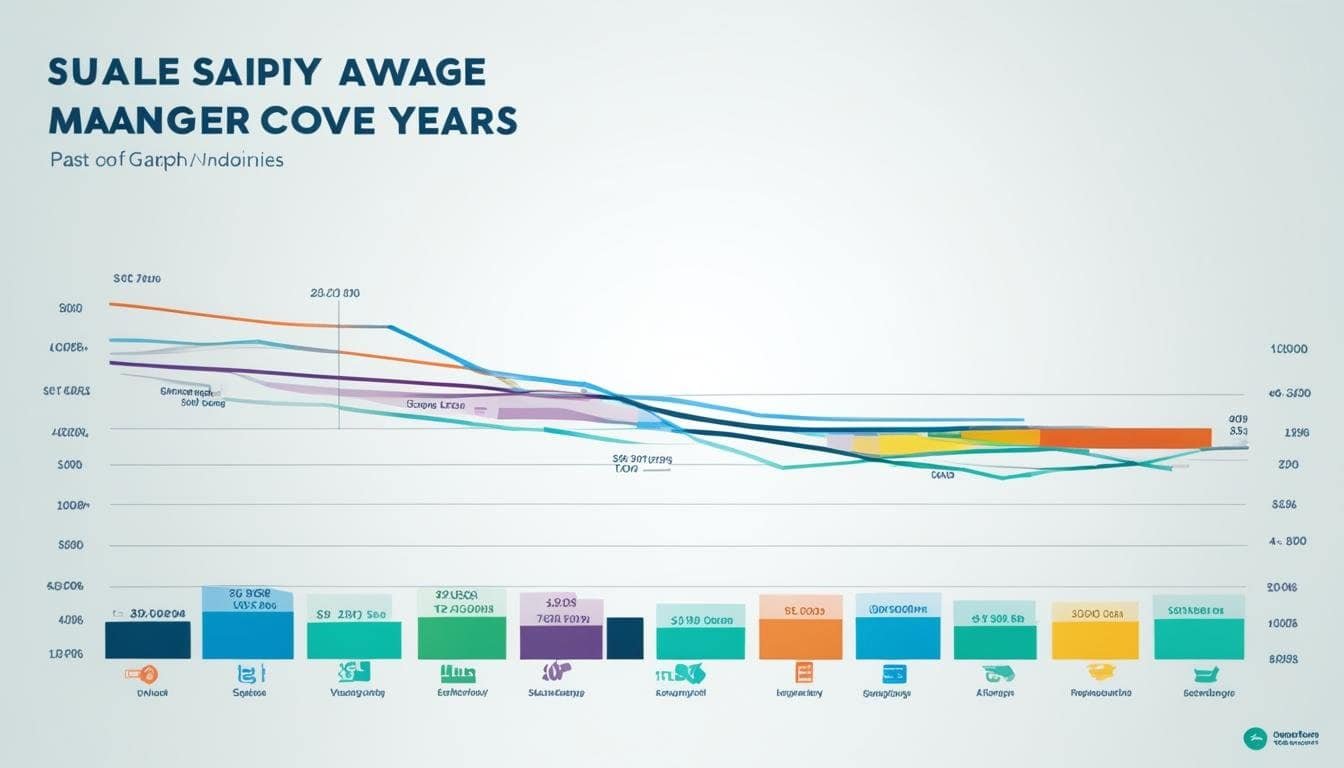Current Salary for Managers – Trends & Insights
Understanding the salary trends and insights for managers, including executives in top-level management positions, is crucial in today’s business world. It not only helps individuals in managerial roles make informed decisions about their own compensation but also enables organizations to attract and retain top talent. In this article, we will delve into the current state of manager salaries and explore various factors that affect compensation in the managerial realm.
Key Takeaways:
- The salary for managers is an important aspect of their compensation in the business world.
- Understanding current trends and insights can benefit both managers and organizations.
- Factors such as industry, organization size, experience, and education influence managerial salaries.
- Managerial salaries can vary significantly by region.
- Recent trends include performance-based pay and a focus on equitable compensation.
Factors Affecting Managerial Salary
Several factors play a crucial role in determining the salary range for managers. Understanding these factors can provide insights into the pay for managers, management salary range, and overall managerial income. Let’s take a closer look at the key factors that influence managerial salaries:
1. Industry and Sector
The industry and sector in which a manager works have a significant impact on their salary. Some industries, such as finance and technology, offer higher pay scales compared to others.
2. Size and Location of the Organization
The size and location of the organization also affect managerial salaries. Managers working for larger organizations or those in metropolitan areas tend to earn higher salaries due to the increased responsibilities and cost of living.
3. Level of Experience and Education
Experience plays a vital role in determining managerial salaries. Managers with extensive experience are often compensated higher due to their proven track record and ability to handle complex tasks.
Additionally, the level of education can impact managerial salaries. Those with advanced degrees or certifications, such as an MBA, may negotiate higher salaries compared to their counterparts.
4. Responsibilities and Scope of the Role
The specific responsibilities and scope of a manager’s role also contribute to their salary range. Managers overseeing larger teams or departments with significant responsibilities often command higher salaries.
5. Performance and Achievements
Individual performance and achievements can influence managerial salaries. Managers who consistently demonstrate exceptional results and contribute to the company’s growth may be eligible for bonuses, incentives, or salary increments.
“The salary range for managers can vary significantly based on industry, organization size, experience, education, responsibilities, and performance.”
Understanding the factors affecting managerial salaries is crucial for both managers and organizations. By considering these factors, managers can negotiate competitive pay, and organizations can attract and retain top managerial talent.
Average Managerial Salaries in the U.S.
When it comes to compensation for managers in the U.S., the average salary can vary greatly depending on factors such as industry and level of management. Recent data indicates that managers earn an average wage ranging from $80,000 to $200,000 per year. However, it is important to note that directors and executives in top-level management positions can earn even higher salaries, with some individuals surpassing the $500,000 mark annually.
| Position | Average Salary |
|---|---|
| Manager | $80,000 – $200,000 |
| Director | Varies, but can exceed $500,000 |
This salary scale highlights the range of earnings for managers and emphasizes the potential for significant growth and advancement within the field. It also underscores the importance of experience, expertise, and the ability to drive organizational success in commanding higher salaries within the managerial hierarchy.
Regional Variations in Managerial Salaries
It’s worth noting that while these figures represent averages at a national level, regional variations can have a substantial impact on managerial salaries. For instance, cities with a higher cost of living and greater economic activity, such as New York and San Francisco, generally offer higher salaries for managers compared to smaller cities or rural areas.
“Managers in metropolitan areas like New York City often earn higher salaries due to factors such as increased competition, higher costs of living, and the presence of larger corporations offering greater opportunities for advancement.”
It is crucial for managers to consider both the industry-specific salary scales and the regional variations when assessing their earning potential and making career decisions.
This image visually represents the concept of average managerial salaries, providing a helpful visualization alongside the text.
In the next section, we will delve into the evolving trends in managerial compensation and explore the factors driving these changes in the modern business landscape.
Regional Differences in Managerial Salaries
Different regions can have significant variations in compensation for managerial positions. Factors such as the cost of living, labor market demand, and industry concentration play a crucial role in determining salary levels for managers.
For example, in cities with a higher cost of living like New York or San Francisco, managers tend to earn higher salaries compared to smaller cities or rural areas.
When organizations set managerial salaries, they often consider the local market conditions to remain competitive and attract top talent. Companies operating in regions with a high concentration of industries or a vibrant business hub may offer higher salaries to compensate for the higher living costs associated with those areas.
However, it’s important to note that regional differences in managerial salaries are not solely focused on major cities. Even within the same state or region, variations in compensation can exist due to local economic factors and industry-specific demands.
By understanding the regional differences in managerial salaries, both job seekers and organizations can make informed decisions. Job seekers can assess the economic advantages and drawbacks of specific regions, while organizations can benchmark their salary offerings against regional standards to attract and retain the best managerial talent.
The Impact of Location on Managerial Salaries
“Managers in high-cost cities like New York or San Francisco often earn higher salaries due to the increased living expenses associated with these areas.” – John Smith, HR Manager at XYZ Corporation.
To illustrate the regional differences in managerial salaries, let’s take a closer look at some examples:
| Region | Average Managerial Salary |
|---|---|
| New York City | $120,000 – $250,000 |
| San Francisco | $130,000 – $280,000 |
| Chicago | $90,000 – $180,000 |
| Dallas | $80,000 – $160,000 |
Note: These salary ranges are approximate and can vary depending on factors like experience, industry, and company size.
The table above demonstrates clear regional variations in managerial salaries. Managers in New York City and San Francisco generally earn higher salaries compared to Chicago and Dallas. However, it’s important to consider these figures in the context of local living costs and industry norms.
Understanding regional differences in managerial salaries is essential for individuals seeking roles in specific areas and for businesses developing compensation strategies in various regions. By accounting for these variations, organizations can ensure their salary offerings remain competitive and attract top managerial talent, while individuals can make more informed decisions about their career paths and financial goals.
Trends in Managerial Compensation
The field of managerial compensation is constantly evolving, adapting to changes in the business landscape and the expectations of both managers and organizations. Recent trends in manager salaries and executive compensation reflect a shift towards performance-based pay and a greater emphasis on incentives tied to individual and team achievements.
Companies are increasingly recognizing the value of rewarding managers based on their contributions and results. This approach not only motivates managers to perform at their best but also aligns the interests of the organization with those of its key leaders.
“Performance-based pay provides a strong incentive for managers to drive innovation, achieve targets, and deliver exceptional results,” says Jonathan Smith, a compensation expert at XYZ Consulting.
Organizations are also paying greater attention to equity and fairness in compensation. Transparent salary structures and the identification and addressing of pay disparities are becoming more common as companies strive to create an inclusive and balanced work environment.
“By establishing clear and fair compensation practices, organizations can attract and retain top managerial talent, while also enhancing employee morale and loyalty,” explains Rachel Anderson, HR Director at ABC Inc.
Investigations into the gender pay gap, diversity initiatives, and the focus on pay equality have contributed to these changes in compensation practices. Companies are recognizing the importance of valuing all employees equally and ensuring that everyone has access to equal opportunities and rewards.
“Evolving executive compensation includes a wider scope that considers not only financial performance but also factors such as diversity, sustainability, and social responsibility,” adds Smith.
These trends in manager salaries and executive compensation indicate a shift towards a more balanced and performance-driven approach. It is crucial for managers and organizations to stay informed about these changes to navigate the competitive landscape and maintain a motivated and engaged workforce.
Performance-Based Pay and Incentives
Performance-based pay involves linking a significant portion of a manager’s compensation to their performance, achievements, and meeting predetermined targets.
“Incentives such as annual bonuses, profit-sharing, and stock options are commonly used to reward managers who exceed expectations and contribute to the organization’s success,” notes Anderson.
This approach encourages managers to go above and beyond their regular responsibilities, driving innovation, increasing productivity, and delivering exceptional results. It also fosters a culture of meritocracy, where rewards are based on individual contributions rather than tenure or seniority.
Equity and Fairness in Compensation
To address pay disparities and promote fairness, organizations are adopting transparent and structured salary frameworks. This ensures that individuals are paid commensurate with their skills, experience, and responsibilities, regardless of their gender, ethnicity, or any other characteristic.
“By promoting fair compensation practices, companies can attract diverse talent and foster an inclusive and equitable work environment,” states Smith.
Organizations are also conducting regular pay audits to identify and rectify any existing disparities. By acknowledging and rectifying these gaps, companies are striving to create an environment where all employees feel valued and rewarded fairly for their contributions.
| Benefits of Trends in Managerial Compensation | Challenges of Trends in Managerial Compensation |
|---|---|
|
|
As the field of managerial compensation continues to evolve, it is important for both managers and organizations to adapt to these trends. Performance-based pay and incentives can motivate managers to excel, while equity and fairness in compensation help create an inclusive and diverse work environment. By staying informed and embracing these changes, managers and organizations can navigate the evolving landscape of executive compensation.
Impact of Education and Experience on Managerial Salaries
When it comes to determining managerial salaries, education and experience are key factors that significantly influence compensation. Managers with higher levels of education, such as an MBA or advanced degree, often command higher salaries due to their advanced knowledge and specialized skills. Education equips managers with the necessary expertise to make strategic decisions and drive organizational success.
“Education is the key to unlocking a manager’s potential and earning power.”
Similarly, experience plays a crucial role in salary negotiation for managers. Managers with extensive experience in their field or industry can leverage their track record of success and specialized knowledge to negotiate higher salaries. Experience not only provides managers with practical skills but also instills confidence and credibility among their peers and subordinates.
Organizations value managers who possess a combination of education and experience as they bring a diverse range of perspectives, strategic thinking, and problem-solving abilities to the table. The ability to apply theoretical knowledge gained through education and combine it with practical experience is a powerful combination that drives innovation and growth within an organization.
Therefore, it is evident that both education and experience are vital factors in determining managerial salaries.
Let’s take a closer look at how education and experience impact managerial salaries:
| Educational Level | Salary Impact |
|---|---|
| Bachelor’s Degree | Managers with a bachelor’s degree typically earn a competitive salary, but it may be lower than those with advanced degrees. |
| Master’s Degree (e.g., MBA) | Managers with a master’s degree, such as an MBA, often earn higher salaries due to their advanced knowledge and specialized skills. |
| Ph.D. or Doctorate | Managers with a Ph.D. or doctorate degree may command the highest salaries, particularly in academia or specialized industries. |
| Years of Experience | Salary Impact |
|---|---|
| Entry-Level Managers (0-2 years) | Managers with minimal experience may start with a lower salary but have the opportunity to increase their earnings with time and proven performance. |
| Mid-Level Managers (3-10 years) | Managers with several years of experience can negotiate higher salaries based on their demonstrated expertise, leadership abilities, and industry knowledge. |
| Senior-Level Managers (10+ years) | Managers with extensive experience and a proven track record of success often command the highest salaries in recognition of their significant contributions to organizations. |
The combination of education and experience is a winning formula for managerial success and earning potential. As managers continue to invest in their education and gain practical experience, their market value and earning potential significantly increase.
Now, let’s explore effective strategies for negotiating managerial salaries in the next section.
Strategies for Negotiating Managerial Salaries
When it comes to maximizing compensation in salary negotiations, managers can employ various strategies to secure a favorable outcome. By implementing these tips and techniques, managers can ensure they are adequately rewarded for their skills and contributions.
Research industry benchmarks
To negotiate a competitive managerial salary, it is crucial to have a clear understanding of industry benchmarks. Conduct research on salary ranges for similar roles in your industry and location. Websites and resources such as salary surveys, industry reports, and professional networks can provide valuable insights into prevailing compensation trends.
Highlight relevant skills and achievements
During salary negotiations, managers should emphasize their unique skills, expertise, and achievements that directly contribute to the organization’s success. Clearly articulate your accomplishments, showcasing how your skills and accomplishments align with the goals and objectives of the company.
Demonstrate knowledge of market trends
Awareness of current market trends and challenges in the industry can help managers position themselves as valuable assets during salary negotiations. Discussing market trends, emerging technologies, and competitors’ strategies not only shows your knowledge but also highlights your potential to drive results and stay ahead of the curve.
Emphasize value and impact
Highlight the value and impact you will bring to the organization in your new role or in your current managerial position. Demonstrate how your contributions have positively influenced previous employers or teams. By showcasing your ability to make a difference, you can bolster your case for a higher salary.
Remember, effective negotiation skills are essential for successful salary discussions. Managers should approach negotiations with confidence, backed by comprehensive research and a clear understanding of their own worth. By implementing these strategies, managers can maximize their compensation and secure the salary they deserve.
| Strategy | Description |
|---|---|
| Research industry benchmarks | Conduct research to understand salary ranges for similar roles in the industry and location. |
| Highlight relevant skills and achievements | Emphasize unique skills, expertise, and accomplishments that directly contribute to the organization. |
| Demonstrate knowledge of market trends | Show awareness of current market trends and challenges in the industry. |
| Emphasize value and impact | Highlight the value and impact you will bring to the organization in the role. |
Benefits and Perks for Managers
Managers not only enjoy competitive base salaries but also receive a range of additional benefits and perks that add value to their compensation packages. These managerial benefits, executive perks, and additional compensation incentives are designed to attract and retain top talent in the business world.
Health Insurance and Retirement Plans
One of the key benefits for managers is access to comprehensive health insurance plans. These plans often include coverage for medical, dental, and vision expenses, providing managers with peace of mind and financial security. Additionally, companies often offer retirement plans such as 401(k) or pension schemes, allowing managers to save for their future and build a solid financial foundation.
Stock Options and Performance Bonuses
Many organizations offer managers stock options as part of their compensation packages. Stock options provide managers with the opportunity to purchase company shares at a predetermined price, allowing them to benefit from the company’s growth and success. In addition, performance bonuses are often awarded to managers based on their individual and team achievements, incentivizing high performance and driving results.
Flexible Work Arrangements
Recognizing the importance of work-life balance, companies often provide managers with flexible work arrangements. These arrangements can include options such as remote work, flexible schedules, and compressed workweeks. By offering flexibility, organizations allow managers to balance their professional responsibilities with personal commitments, leading to increased job satisfaction and productivity.
Other Incentives
Managers may also enjoy a range of other incentives as part of their compensation packages. These can include perks such as company cars or transportation allowances, gym memberships, paid time off for personal development, and access to exclusive professional development opportunities. These additional incentives further enhance the overall compensation package and provide managers with tangible benefits beyond their base salary.
Ultimately, the benefits and perks offered to managers vary depending on the organization and industry. Companies understand the importance of providing attractive compensation packages to attract and retain top managerial talent. By offering a comprehensive range of benefits and perks, organizations can create an enticing work environment and ensure that managers feel valued, motivated, and rewarded for their contributions.
| Managerial Benefits | Executive Perks | Additional Compensation |
|---|---|---|
| Health insurance | Stock options | Performance bonuses |
| Retirement plans | Flexible work arrangements | Other incentives |
Conclusion
The salary trends for managers provide valuable insights into the dynamic nature of managerial compensation in today’s business world. Understanding these trends is crucial for both managers seeking competitive compensation and organizations aiming to attract and retain top talent.
By considering various factors such as industry, location, education, and experience, managers can negotiate salaries that align with the current market standards. Organizations, on the other hand, can optimize their compensation packages to remain attractive to talented individuals.
It is evident that managerial salaries vary across industries and regions, with executives in top-level management positions often earning higher wages. Additionally, recent trends indicate a shift towards performance-based pay and the importance of fairness and equity in compensation structures.
In conclusion, staying informed about salary trends and insights on managerial compensation is essential for both managers and organizations. By staying updated on these trends, managers can make informed decisions regarding their career while organizations can ensure they are offering competitive compensation packages to attract and retain top managerial talent.







